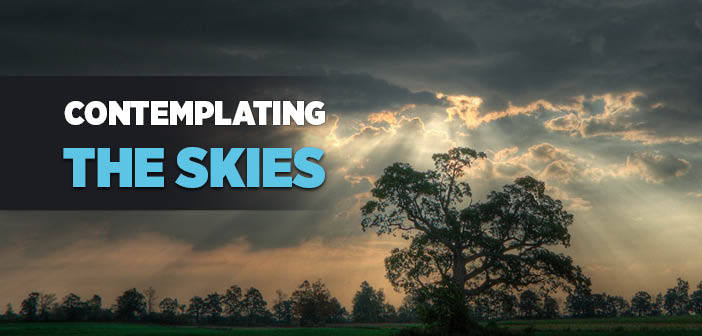Why should we not give up contemplation? What are the benefits of contemplation?
How amazing it is that man is infatuated upon seeing an ostentatious, embellished palace. The sight never leaves his mind, as he keeps on spreading the news of its beauty for the rest of his life. But in spite of constantly seeing the grand Divine masterpiece of art that is the universe, he shrinks back from thoroughly reflecting on it and shies away from making an adequate mention of it. He takes no notice of it and carries on, like it is an ordinary thing. Little is he aware that the palace he admires so much is but a tiny particle of Earth, which in turn is one of the smallest specks of the grand universe…
A person oblivious to contemplating Divine Power resembles the ant in the below parable:
An ant builds a nest in a king’s palace, which is surrounded by high walls, built on a solid foundation, decorated by the most exquisite furniture and swarming with servants. When encountering its friends upon making its way out of its nest, the ant speaks to them about nothing but its nest, the crumbs it gathers and how it stocks them for the morrow. The ant is utterly and almost hopelessly remote from the thought of the magnificent palace in which it roams and the power, splendor and sovereignty of the king. Its ignorance is all the more compounded by the fact that he is completely unmindful of those who live there.
An ignorant man is also unmindful of the Almighty’s divine masterpieces of art, the angels and the righteous person living in His dominion.
There is no way that an ant can become aware of a palace and the beauties it boasts. But through contemplation and imagination, we humans can journey through many realms. In a humble return for the countless blessings the Almighty has endowed him with, a person can come to terms with his nothingness and vulnerability, and prostrate in gratitude. Only a ‘human’ can do this; or in other words, only those who do this can carry the honor of humanness. Indeed, humanity has a natural predisposition and ability for contemplation. Gradually laying waste to this potential by not putting it to use is to betray Divine trust and to bid farewell to one of man’s most defining attributes.
The great Mawlana Rumi provides the following parable to describe those who roam on the display of eternal mysteries and wisdom that is Earth with an idle heart and respond to the glaring Divine messages radiating forth from creation with so little as a dim-witted expression.
“An ox one day came to Baghdad and strolled around town from tip to toe. But amid all the beautiful sights, tastes and masterpieces, only some melon and watermelon peels dumped on the side of the road caught its attention. After all, befitting the gaze of an ox or a donkey is either hay scattered on a road, or weed and grass growing from its fringes.” (Mathnawi, v.4, couplet: 2377-2329)
It is said that a certain man during the time of Musa –upon him peace- had worshiped persistently for thirty years; such that a cloud had even begun to shade him during his times of worship, owing to his piety. But there came a day when the cloud did not make its appearance, leaving the man to worship in the sun. He went to his mother to see if she might know the reason.
“You must have committed a sin”, she commented.
“No”, he responded. “I do not believe I have!”
“Did you not gaze at the skies, the flowers? Were you kept back from contemplating the splendor of Allah despite seeing them?” she asked.
“Yes”, the man then confessed. “I failed to contemplate in spite of seeing the wonders around me.”
“Are you looking for a greater sin than that?” his mother then said. “You must repent immediately!”
A believer of right mind must therefore never neglect the duty to contemplate.
The more a person learns of the magnificence of the Almighty’s art and the more he contemplates it, the more his wisdom of the Almighty’s Glory and Majesty and his proximity to the Truth will be.
Ali –Allah be well-pleased with him- has said, “Expanding knowledge of the Quran with some knowledge of astronomy enables one to grow in faith and certainty”, after which he quoted the following verse:
“Most surely in the variation of the night and the day, and what Allah has created in the heavens and the earth, there are signs for a people who guard (against evil).” (Yunus, 6)
Every single being created by the Almighty, serves a specific purpose within the Divine order. Until now, mankind has been able to gain acquaintance with only a few of these purposes. Wisdom unseen and as yet not comprehended are multitudes infinitely greater in number than compared to those thought to have been understood.
If we know what sound is, it is because we have receptive organs like ears. If we know what color is, it is all thanks to our eyes. Who knows of the many Divine manifestations in this infinite realm of being of which we have absolutely no clue, simply because we are deprived of the receptive organs to sense them.[1]
Restrained by a limited power of reason, how can man be able to perfectly comprehend Allah, glory unto Him, when he cannot even completely grasp the entire creatures and their specific characteristics? Muslim scholars, who were able come to terms with just an infinitesimal glimpse of the Almighty’s Splendor and the manifestations of His attributes, felt compelled to admit, in awe and dazzle:
“To understand Him is to understand He cannot be comprehended.”
This is because created beings contain no reflection or manifestation of the Almighty’s essential reality. Everything created by Allah, glory unto Him, is constituted by the combinations of Divine attributes. The fact that there has not been created a single space that can endure an essential manifestation of the Almighty is proven by the Divine response “لَنْ تَرٰينِى / You can never see Me” [2] given to Musa –upon him peace- upon his adamant request to see the Almighty, as a consequence of which he ended up passing out. It is for that very reason that, let alone seeing the Almighty’s essential reality, man is limited by an insufficiency to even comprehend the reality of His attributes.
Elegantly depicting this is the late Necip Fâzıl:
The atoms in revel, bedecked, festive,
And a light all around, a light all around,
An architecture entwined, the self entwined,
I identify you Lord, the Famous Unidentified!
[1] The universe, according to Muslim scholars, consists of substances and accidents. Substances are material entities. Accidents, on the other hand, are the perceptible qualities of a material entity. Color and smell, for instance, are accidents perceptible only through the subsistence of a material being. As mentioned above, color would not have been perceived had there been no such thing as eyesight, and smell it were not for smelling. As we are to begin a life of a unique character in the Hereafter, presuming we will then begin perceive accidents of an entirely distinct nature is as conceivable as considering many other accidents to exist, here on Earth, that lie beyond our perception.
[2] al-Arâf, 143.
Source: Osman Nuri Topbaş, Contemplation in Islam, Erkam Public.





